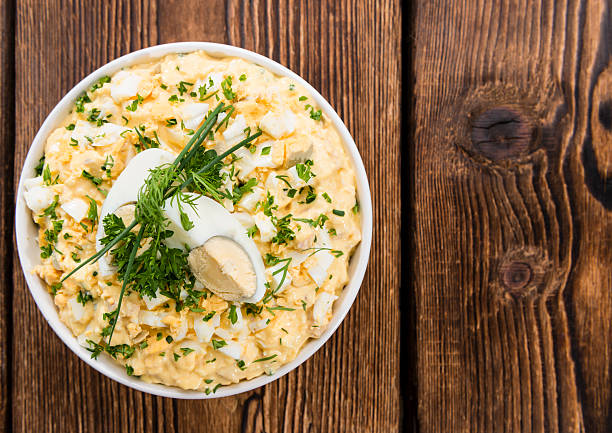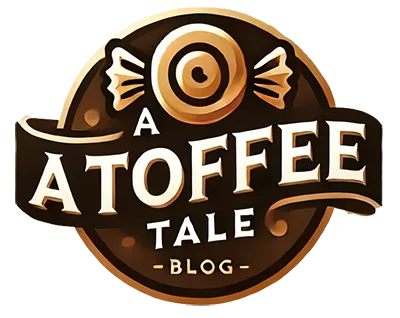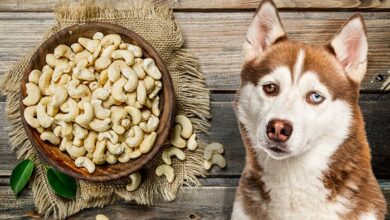Can Dogs Eat Egg Salad? A Pet Owner’s Safety Guide in 2024

Can Dogs Eat Egg Salad? If you’re considering sharing egg salad with your dog, it’s important to understand what’s in it. Common ingredients include boiled eggs, mayonnaise or salad dressing, mustard, salt, spices, and sometimes onions, garlic, or celery. While some ingredients are safe for dogs, others can be harmful.
Each ingredient in egg salad can affect your dog’s health differently. Boiled eggs are safe in moderation, but ingredients like mayonnaise, mustard, and especially onions or garlic can be toxic. Let’s take a closer look at how these ingredients can impact your dog.Lets briefly discuss that- Can Dogs Eat Egg Salad?
Is Egg Salad Safe for Dogs? Can Dogs Eat Egg Salad?
If you’re asking, Can Dogs Eat Egg Salad?, it’s crucial to understand the different ingredients in egg salad and how they affect dogs. While eggs themselves can be a great source of nutrition for your dog, many of the ingredients commonly used in egg salad pose potential health risks. Let’s dive deeper into the benefits and risks of feeding egg salad to dogs.
Potential Benefits of Egg Salad for Dogs
Eggs are a nutritious food for dogs when served plain and cooked properly. Here’s why eggs can be good for your dog:
- Rich in Protein: Eggs are a great source of protein, which is essential for muscle development, healthy tissues, and overall growth. This makes eggs a beneficial addition to your dog’s diet, as protein is a key component of a dog’s daily nutritional needs.
- Packed with Vitamins and Nutrients: Eggs are rich in vitamins A, D, and B12, all of which play a role in supporting your dog’s immune system, promoting a healthy coat, and ensuring overall wellness. These vitamins also support your dog’s bone health and metabolic function.
- Healthy Fats: Eggs contain healthy fats, which can contribute to your dog’s energy levels and help keep their skin and coat shiny. These fats are beneficial, but only in moderation, as too much can lead to weight gain.
Risks to Watch For
Can Dogs Eat Egg Salad? While eggs themselves can be good for your dog, egg salad often contains ingredients that should be avoided. These ingredients can have serious health implications for your dog.
- Mayonnaise: The most common dressing in egg salad is mayonnaise, which is very high in fat. While a small amount might not harm your dog, excessive consumption can cause upset stomach, diarrhea, and even more severe conditions like pancreatitis over time. Dogs with sensitive stomachs are particularly at risk.
- Onion and Garlic: These ingredients are toxic to dogs and should never be included in any food you offer them. Both onions and garlic contain compounds that can damage a dog’s red blood cells, leading to conditions like anemia. Even small amounts can cause harm, so it’s important to avoid egg salad recipes containing these ingredients.
- Excess Salt: Too much salt can be dangerous for dogs. It can lead to dehydration, kidney damage, and in severe cases, sodium poisoning. Many egg salad recipes call for a pinch of salt or other salty ingredients, making it unsafe for your dog to eat.
- Spices and Seasonings: Various spices and seasonings commonly used in egg salad, like mustard, pepper, and herbs, can irritate a dog’s digestive system. Some seasonings might even cause stomach upset or allergic reactions.
What to Keep in Mind
If you’re still asking, Can Dogs Eat Egg Salad?, the answer is that while plain eggs can be a healthy treat, egg salad as a whole is not safe for dogs due to the harmful ingredients it often contains. It’s essential to ensure that any food shared with your dog does not include toxic or unhealthy ingredients like garlic, onion, mayonnaise, or excessive salt. If you want to share an egg-based treat with your dog, make sure to serve the eggs plain, boiled or scrambled without any added seasoning or fat.
Feeding egg salad to your dog isn’t recommended because of the potential risks it carries, primarily due to harmful ingredients like mayonnaise, garlic, onions, and excessive salt. While eggs themselves are nutritious and safe for dogs in moderation, egg salad is best avoided. If you want to offer your dog an egg-based treat, stick to plain, cooked eggs without any seasoning or additives, and always ensure you’re feeding them in appropriate amounts to prevent any health issues.
Toxic Ingredients in Egg Salad to Avoid
When asking, Can Dogs Eat Egg Salad?, it’s important to recognize that not all ingredients in egg salad are safe for dogs. Several common ingredients found in egg salad can be toxic or harmful to dogs, potentially leading to serious health issues. Here’s a breakdown of the toxic ingredients in egg salad and why they should be avoided:
Onions and Garlic
- Dangerous to Dogs: Both onions and garlic are highly toxic to dogs, even in small amounts. These ingredients contain compounds that can damage a dog’s red blood cells, leading to conditions like hemolytic anemia.
- Symptoms of Toxicity: If a dog consumes onions or garlic, it can cause weakness, lethargy, vomiting, diarrhea, and pale gums. The toxicity can accumulate over time, so even small, frequent exposures can lead to serious health problems.
Mustard
- Digestive Upset: Mustard, often used as a seasoning in egg salad, can irritate a dog’s digestive system. It can lead to symptoms like stomach upset, diarrhea, and vomiting. While it may not be fatal, mustard can cause unnecessary discomfort for your dog.
- Avoid Egg Salad: If you’re preparing food for your dog, avoid adding mustard or mustard-based dressings to any recipes, including egg salad.
High-Fat Dressings (Like Mayonnaise)
- Risk of Pancreatitis: High-fat dressings like mayonnaise are commonly used in egg salad but can be harmful to dogs, especially if consumed in large amounts. Dogs that eat foods high in fat, such as mayonnaise, are at risk for developing pancreatitis, a painful inflammation of the pancreas that can lead to long-term health issues.
- Weight Gain and Obesity: Even in smaller amounts, high-fat dressings can contribute to weight gain over time, which can lead to other health problems like joint issues and diabetes.
Salt and Spices
- Excessive Sodium: Salt is often added to egg salad for flavor, but excess sodium is harmful to dogs. Too much salt can cause dehydration, increased thirst, kidney issues, and, in severe cases, sodium poisoning.
- Spices and Seasonings: Spices such as pepper, paprika, and other seasoning blends may irritate a dog’s stomach and intestines. Some spices can even trigger allergic reactions or cause upset stomachs in sensitive dogs.
If you’re wondering, Can Dogs Eat Egg Salad?, it’s important to know that egg salad contains ingredients that can be toxic to dogs. Onions, garlic, mustard, high-fat dressings like mayonnaise, and excessive salt should all be avoided. These ingredients can lead to serious health issues ranging from digestive problems to toxicity and pancreatitis. Instead of egg salad, consider feeding your dog plain, cooked eggs to provide them with the nutritional benefits of eggs without the risks.
Signs Your Dog May Be Sick After Eating Egg Salad
If you’re wondering Can Dogs Eat Egg Salad?, it’s important to recognize the signs that your dog may be experiencing illness after consuming egg salad. The ingredients in egg salad, especially those harmful to dogs like onions, garlic, and high-fat dressings, can lead to a range of symptoms. Here’s what to watch out for:
Symptoms of Digestive Upset
- Vomiting or Diarrhea: If your dog eats egg salad, especially with high-fat dressings or spices, they may experience digestive upset. Vomiting and diarrhea are common signs that their stomach isn’t handling the food well.
- Gas or Bloating: Excessive gas, bloating, or discomfort after eating egg salad can indicate that the ingredients are causing a reaction in your dog’s digestive system. These symptoms are more likely if the egg salad contains rich dressings like mayonnaise or mustard.
Symptoms of Toxicity
- Weakness or Lethargy: Onions and garlic are toxic to dogs and can lead to weakness or lethargy. If your dog seems unusually tired, sluggish, or reluctant to move after eating egg salad, it could be a sign of poisoning.
- Pale Gums: One of the key signs of onion or garlic poisoning in dogs is pale or blue-tinged gums. This occurs due to the breakdown of red blood cells, leading to anemia.
- Difficulty Breathing or Drooling: If your dog starts having trouble breathing or drooling excessively, it could indicate a severe reaction, especially if onions or garlic were consumed. These symptoms require immediate veterinary attention.
What to Do if Your Dog Shows Symptoms
Can Dogs Eat Egg Salad? If you notice any of these signs after your dog eats egg salad, especially if severe symptoms like difficulty breathing or weakness appear, you should act quickly:
- Contact a Vet: If your dog shows signs of toxicity or distress, reach out to your vet immediately. Do not wait for symptoms to subside on their own.
- Monitor Your Dog: In the case of mild symptoms like digestive upset, monitor your dog closely. Make sure they have access to fresh water and rest. However, seek veterinary help if symptoms worsen or persist.
Recognizing the signs of sickness after your dog eats egg salad is crucial. If your dog shows symptoms like vomiting, diarrhea, weakness, or difficulty breathing, it could be a sign of digestive upset or toxicity from harmful ingredients like onions or garlic. Always contact your vet if you’re concerned about your dog’s health after eating egg salad.
Safer Ways to Share Eggs with Your Dog
If you want to share the nutritional benefits of eggs with your dog, there are safer ways to do it without the risks that come with egg salad. While Can Dogs Eat Egg Salad? is not recommended due to harmful ingredients like onions, garlic, and mayonnaise, eggs themselves can be a healthy addition to your dog’s diet. Here’s how to safely share eggs with your dog:
1. Offer Plain Boiled Eggs
- Simple and Nutritious: Boiled eggs are one of the best ways to give your dog the benefits of eggs without the added risks of harmful ingredients. They provide protein, healthy fats, and vitamins that support your dog’s overall health.
- Serve as a Treat or Meal Topper: You can serve boiled eggs as a special treat or break them into small pieces and add them to your dog’s regular meals for extra protein.
2. Prepare Scrambled Eggs Without Butter, Oil, or Spices
- Healthy Scramble: Scrambled eggs can be a tasty treat for your dog, but make sure to skip the butter, oil, and any seasonings. These can upset your dog’s stomach or introduce unhealthy fats.
- Plain Scramble: Simply scramble an egg in a non-stick pan without adding anything extra. This way, your dog can enjoy the egg’s nutrients without any unnecessary additives.
3. Create a Dog-Friendly “Egg Salad”
- Use Chopped Boiled Eggs: Instead of traditional egg salad that may include harmful ingredients like mayonnaise, create a healthier, dog-friendly version with just boiled eggs.
- Add Dog-Safe Ingredients: Mix the chopped boiled eggs with a dollop of plain, unsweetened yogurt or some mashed vegetables like pumpkin. This version will be easier for your dog to digest and won’t cause any stomach issues.
By following these safe ways to share eggs with your dog, you can enjoy the benefits of eggs without worrying about the risks that come with traditional egg salad. Offering plain boiled eggs, scrambled eggs without added fats, or creating a simple, dog-friendly egg salad with safe ingredients ensures your dog gets the nutrition they need without any harmful additives. Always remember to keep harmful ingredients like onions, garlic, and excessive fat out of your dog’s diet for their health and well-being.
Tips for Feeding Human Foods to Dogs Safely
Feeding your dog human food can be a special treat, but it’s important to be cautious. Some human foods, like Can Dogs Eat Egg Salad?, contain harmful ingredients that can cause serious health issues. Here are some tips to help you feed your dog safely:
1. Avoid Foods with Mixed Ingredients Like Egg Salad
- Stick to Simplicity: When sharing human food with your dog, it’s best to avoid dishes that contain multiple ingredients, especially if they might include harmful ones like garlic, onions, or high-fat dressings. Egg salad is a good example of a food that can be risky due to its toxic ingredients.
- Single-Ingredient Foods Are Safer: Instead, offer single-ingredient foods like plain boiled eggs, plain vegetables, or lean meats. This reduces the chances of your dog ingesting something harmful.
2. Stick to Plain, Single-Ingredient Treats
- Simple Is Best: Plain, unseasoned food is often the safest choice for dogs. Foods like boiled eggs or fresh fruit without added sugar or seasoning are easy for dogs to digest and free from harmful additives.
- Avoid Added Ingredients: Foods with spices, sugar, or oils can upset your dog’s stomach or cause more serious health issues.
3. Check Food Labels for Hidden Toxins Before Sharing
- Look for Toxic Ingredients: Before sharing any human food with your dog, always check the label. Some foods may contain hidden ingredients like artificial sweeteners (e.g., xylitol), onions, or preservatives that can be toxic to dogs.
- Be Aware of Unknown Additives: Even foods that seem safe might contain harmful chemicals or seasonings. Reading labels helps you avoid hidden dangers.
4. Always Consult Your Vet Before Introducing New Foods
- Vet Approval Is Key: Every dog is different, and some may have food sensitivities or allergies. Before introducing a new food into your dog’s diet, especially human foods, consult your vet to ensure it’s safe for your pet.
- Personalized Guidance: Your vet can help you decide which foods are safe based on your dog’s health and dietary needs.
Conclusion
Feeding your dog human foods can be a fun way to share a special treat, but it’s essential to take precautions. Avoid foods like egg salad, which contain mixed ingredients and potential toxins, and stick to simple, safe options. Always check labels and consult your vet to ensure that your dog’s treats are both safe and nutritious. By following these tips, you can share food with your dog without putting their health at risk.




